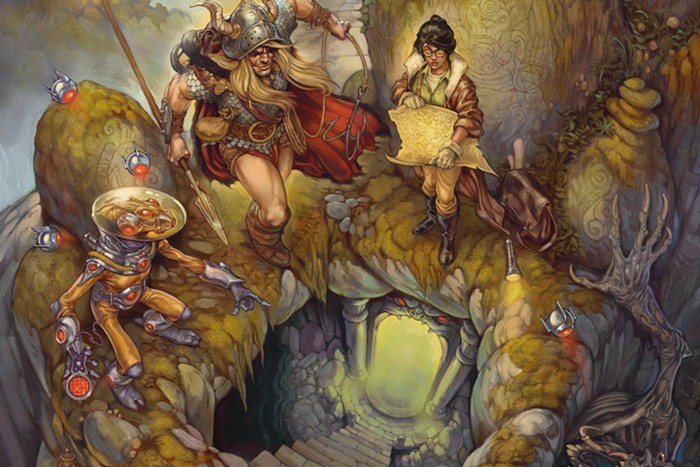If you were to read Sarah Vowell's books in order, you'd notice a striking transition. She began like David Sedaris, another NPR talent prone to personal essays packed with quirk and the slightly askew perspectives that have transformed This American Life into a beloved storytelling brand. But gradually she wandered into unmapped territory, and her last three books—Assassination Vacation, The Wordy Shipmates, and, now, Unfamiliar Fishes—became something different. She's a historian now, specializing in minor and unexplored notes of the American story. But "historian" is too stuffy and academic a term to describe Vowell; she's more of a history enthusiast (histhusiast!), obsessed with all the weird, lonely nerds who have made America what it is today.
Unfamiliar Fishes tells the story of Hawaii's path to statehood. This is basically how every territory became a state—missionaries move in to teach the natives, big business moves in to cash in on local resources, and America rolls over the locals as the territory is assimilated into the union. But the details are uniquely Hawaiian, involving royalty, rogue Mormons, and a campaign to tame a language that revels in generalization.
Vowell's enthusiasm for the minutiae of history is infectious. She describes American academia at the turn of the 19th century, just after the Revolutionary War: "This generation did not just read Voltaire; they literally addressed each other as 'Voltaire' the way kids today call one another dude. Like, 'Voltaire, I'm so high right now.'" The president (and minister) of Yale anonymously published "an epic poem narrated by the Devil," which was dedicated to Voltaire for proving "that the chief end of man was to slander his god and abuse him forever."
Even as the liberal Voltaireans were embracing a few Hawaiian natives on the mainland (unless those natives wanted to marry white women, in which case they would naturally respond with threats of bloody murder), more conservative missionaries were heading west to the islands. Vowell, a self-described "godless heathen" who says, "If I had to pick a spiritual figurehead to possess the deed to the entirety of Earth, I'd go with Buddha, but only because he wouldn't want it," happily admits her bias against missionaries—"a bunch of strangers showing up somewhere uninvited to inform the locals they are wrong." But she admires the courage of the missionaries. She imagines the bravery of the women chained into arranged marriages and then shipped to the ends of the earth with the charge to worship God first and their husbands a close second.
Vowell admits she's biased toward the natives. But she writes about their flaws, too. The royal family was inbred to the point of sterility and inclined to spending ridiculous amounts of money for the sake of appearances (we Americans wouldn't know about that). But they knew how to have fun: To the dismay of missionaries, whole festivals were held to celebrate the genitals of the kings and queens of Hawaii. Sweeping laws could be immediately and happily forgotten when a king realized that, say, it was stupid to prevent men and women from eating together. And Vowell taps into the sadness that today still lies just below the cheery, tourist-friendly beach culture, the wary sense that the culture lost too much when it bargained with the mainland for money, clout, and global legitimacy.
Unfamiliar Fishes does commit perhaps the worst sin for a history book: It drags and drones. The biggest problem is that Vowell decided to forego chapter breaks, leaving the whole thing as one gigantic, structureless run-on narrative. Vowell flits from character to character with nothing but chronological order linking them. And she can't quite shake her early career tendency to insert herself into the story as a crutch, almost defensively (she alludes way too often, say, to the research that went into the book). The occasional delicious observation about being a tourist in Hawaii aside, there are too many extraneous interviews with islanders just tossed into the shapeless, soupy narrative.
But Vowell is still more fun than a 747 full of David McCulloughs. And the truth is that paradise is often monotonous; her sometimes languid pace and delighted autobiographical additions are probably a fair simulation of the experience of an uptight New Englander spending some time in Hawaii. You decide whether you want to go on that trip. ![]()



















